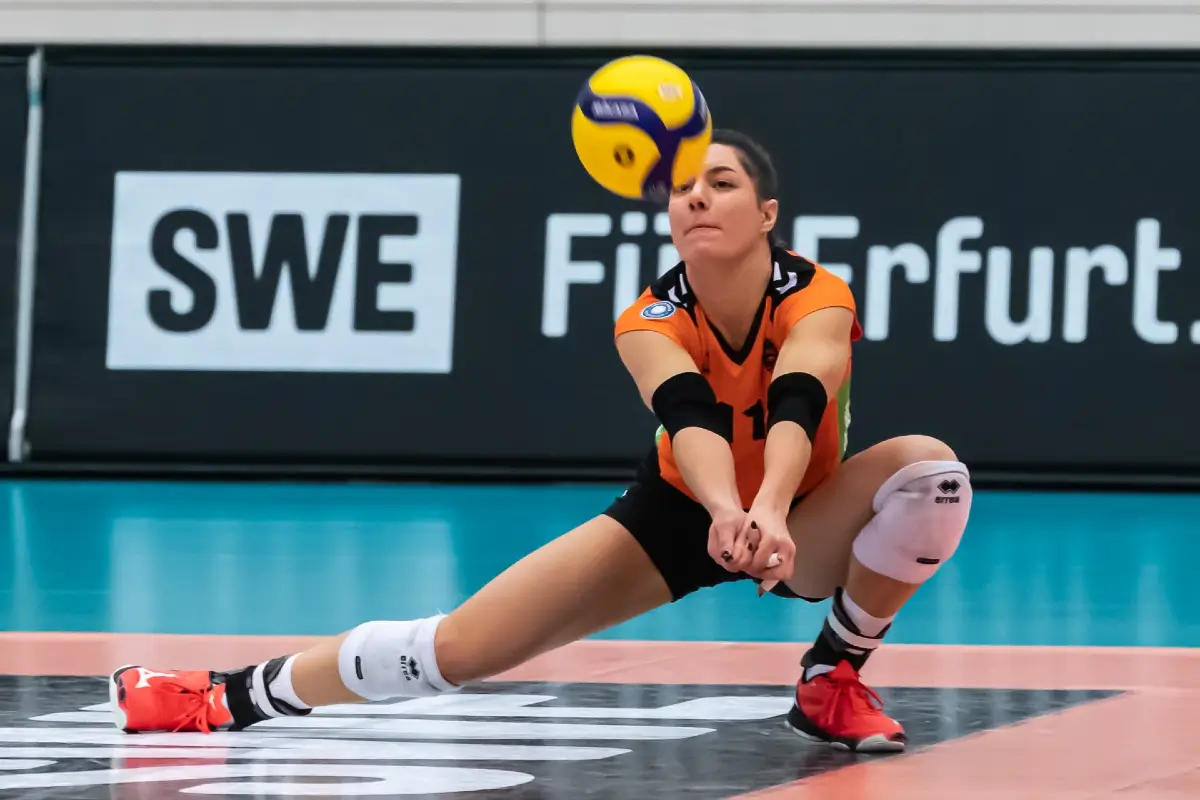Last Updated: February 16, 2024
The defensive specialist (DS) is often referred to as the strategist in the team. The position is different from the classic libero, yet there are areas where they overlap. However, the player must be well-trained in defense techniques.
The DS is in a mentally strong position. Players in this position are often introduced later in the game, only to replace tired players and boost the team mentally.
Often overlooked, the position isn’t as popular as others, yet the DS can change the outcome of a game if used correctly. Their presence on the court can start in the first minute or later into the game.
Responsibilities Associated with the Defensive Specialist Role

1. Receiving Serves
While literally anyone on the court can receive a serve, the defensive specialist must be specialized in taking serve with no issues whatsoever. On the same note, receiving a serve also coincides with passing the ball correctly.
Indeed, there are times when a serve can be very difficult to receive, but that’s what makes a DS such a useful player, turning defense into a potential attack.
Being a top-notch DS implies training to receive serves and turn them into effective passes. The moment the ball gets over the net, it’s up to the DS to cover it.
2. Passing
Despite the name, a DS isn’t all about defending, but mainly about passing correctly. For this reason, ball control is critical. The player must be always focused. As for ball control, there are different techniques to train on.
You need to understand the best position for the body, keep the knees bent, and ensure that your posture allows you to go in any direction. You’ll most likely have to work in a tight collaboration with a libero, so communication is essential.
3. Digging the Ball
As soon as the ball gets over the net, the defensive specialist must dig it out.
Just like the middle blocker, the defensive specialist must pay attention and observe hitters. If the ball does go past the middle blocker, the DS must be there to save it. Observing and reading hitters’ styles will help you predict where the ball would go.
Digging is a difficult skill, and that’s one of the reasons why this position is so complicated. It isn’t all about saving the ball. But when it comes to the pass, you need to face the direction where you want to pass.
4. Teamwork
Volleyball is a teamwork game. No matter what position you’re in, it’s critical to communicate and play based on your teammates’ styles, too. However, the DS often requires more attention than others.
Communication is essential at this point because, given the position, the DS has a better field of view and can notify teammates.
Then, there are situations when the DS is the only one who can save a ball. Again, communication is important to prevent mistakes. The more they communicate, the more trust they’ll gain from other teammates.
5. Covering Others
The defensive specialist requires a high degree of flexibility, which implies covering teammates, too. Imagine the ball getting blocked or returned immediately, the DS must cover it straight away.
Given the position, vision over the court, and observation, the DS should be able to anticipate where the ball will go. If there’s no cover, they can go and handle it.
One of the main responsibilities is when approaching the ball. Experienced defensive specialists should tell whether the ball will go short, downline, or crosscourt. Once they identify an issue, they can call it out to their teammates as well. Once again, communication makes the difference.
Skills Required to be a Good Defensive Specialist
Some players go for this position because they love responsibility. Others simply possess the right skills, so they make an excellent addition to their teams if they go for it.
Accuracy and consistency are very important skills for this position. Many times, an opponent’s attack can be turned into your team’s attack by swapping it around, and that requires excellent accuracy for passes.
While experience isn’t something you can train, the more experienced you become, the easier it will be to identify the best areas on the court to cover. Each game is different, and your tactics must be based on the opponent team’s tactics.
Endurance shouldn’t be overlooked, either. You must be able to take hits from other hitters, but you should regain your position and posture in no time.
Communication skills, once again, are critical. You can train this. You need to follow a certain code and make sure your team communicates effectively to avoid costly mistakes.
Persistence? Just as important. No matter how many times you fail in a game, you need to keep trying your best. It happens. Some games are better than others. But the greater your persistence, the more consistency you’ll achieve, too.
Last, but not least, a bit of aggression hasn’t hurt anyone, but this level of aggression requires confidence too. When you’re aggressive, you should never hesitate to go for the ball when it’s the right time to do it. You can also call out for it, assuming you’re confident in what you’re about to do.
Different Drills to Enhance your Defensive Specialist Position
There are all kinds of drills you can focus on in order to become better for this position. Here are a few of them:
- Role flexibility – The more roles you play, the better you’ll understand the game and others’ points of view, strengths, and challenges.
- Deep passing – Deep balls must be returned in an effective manner, as it’s usually the DS who’s responsible for them.
- Spiking – You’ll need a net to practice spiking. You can do it without one, too, but your skills will be limited.
- Passing from the exercise ball – This drill is mainly about practicing contact that occurs when you dive.
- Rolling the exercise ball – This is another useful drill for defensive players, aiming to practice the impact without the actual impact.
Final Thoughts
The defensive specialist is an overlooked position, but one that can certainly change the outcome of a game. Of course, like for any other position, it’s imperative for someone with the right skills and experience to fill it up.
Although the defensive specialist is often considered a libero, there are clear differences between the two. Being a DS adds versatility to your game. It is a tough role, indeed, but if you’re good enough to master it, you’ll make a huge difference in the long run, game by game.
